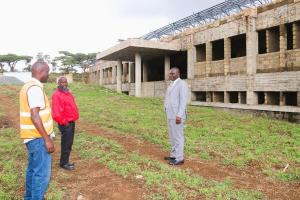
 Prof. Josiah Ouma, Associate Professor of Organic Chemistry at Egerton University, inspects progress 9of the construction of the International Centre of Excellence in Biotechnology at Egerton University, Njoro.
Prof. Josiah Ouma, Associate Professor of Organic Chemistry at Egerton University, inspects progress 9of the construction of the International Centre of Excellence in Biotechnology at Egerton University, Njoro.
The facility, to be developed under the United Nations, which is affiliated with the International Centre for Genetic Engineering and Biotechnology (ICGEB), will serve scientists across the region while driving innovations in food security, health, and sustainable development.
The Centre will be owned by the Kenyan government on behalf of other ICGEB member states, with oversight provided through the National Commission for Science, Technology and Innovation (NACOSTI).
During the official opening of the Kenya National Research Festival 2025 at Egerton University, Agriculture and Livestock Development CS Mutahi Kagwe said research is not peripheral to development but central to national progress.
He confirmed that Kenya is establishing and expanding regional centres of excellence that reflect the country’s diverse agroecological zones.
“These centres serve as hubs for applied research, knowledge dissemination, and inclusive innovation. However, our legacy of research must now leverage emerging technologies to evolve into a more coordinated system nationally,” said the CS.
“At the same time, research infrastructure—including laboratories, data platforms, germplasm banks, and bioeconomy incubators—must be recognised and supported as strategic public assets.”
Kagwe pointed out the importance of ensuring that research outcomes translate into tangible benefits for farmers, producers, and consumers.
Prof Walter Oyawa, the International Centre for Genetic Engineering and Biotechnology (ICGEB) Governor for Kenya said the research centre will be based at Egerton University’s main campus in Njoro Sub-County, the second such outfit in the world after the one in China.
It will specialise in food safety, molecular plant breeding, molecular plant pathology and entomology, genetic biofortification, development of molecular diagnostic tools and their applications and bioprospecting for biopesticides and bioactive compounds.
He said establishment of the Regional Research Centre in the Kenya comes at an opportune time as biotechnology development remains a top priority in enhancing food security, evolving more efficient and cleaner industrial manufacturing processes, and reducing negative effects on the environment in Kenya.
Prof. Josiah Ouma, Associate Professor of Organic Chemistry at Egerton University, said the state-of-the-art facility will serve as a regional hub for cutting-edge research accessible to scientists across Africa. Its mandate is to advance biotechnology and emerging technologies to address local and regional development needs.
Currently in its early development stages, the centre will also provide specialized training for postgraduate students and postdoctoral fellows.
“The programmes will focus on product development and technology transfer, strengthening the link between research and innovation,” Ouma explained.
He added that the facility will allow researchers to collaborate with regional peers while localising technologies to meet Kenya’s needs. Construction is already underway at Egerton University, with the centre expected to be operational within one to two years.
“For now, we will begin with plant sciences, focusing on crops, crop diseases, resilience, and optimization, all geared towards food and nutrition security,” said Ouma.
“Over time, the scope will expand to include animal and microbial biotechnology.”













